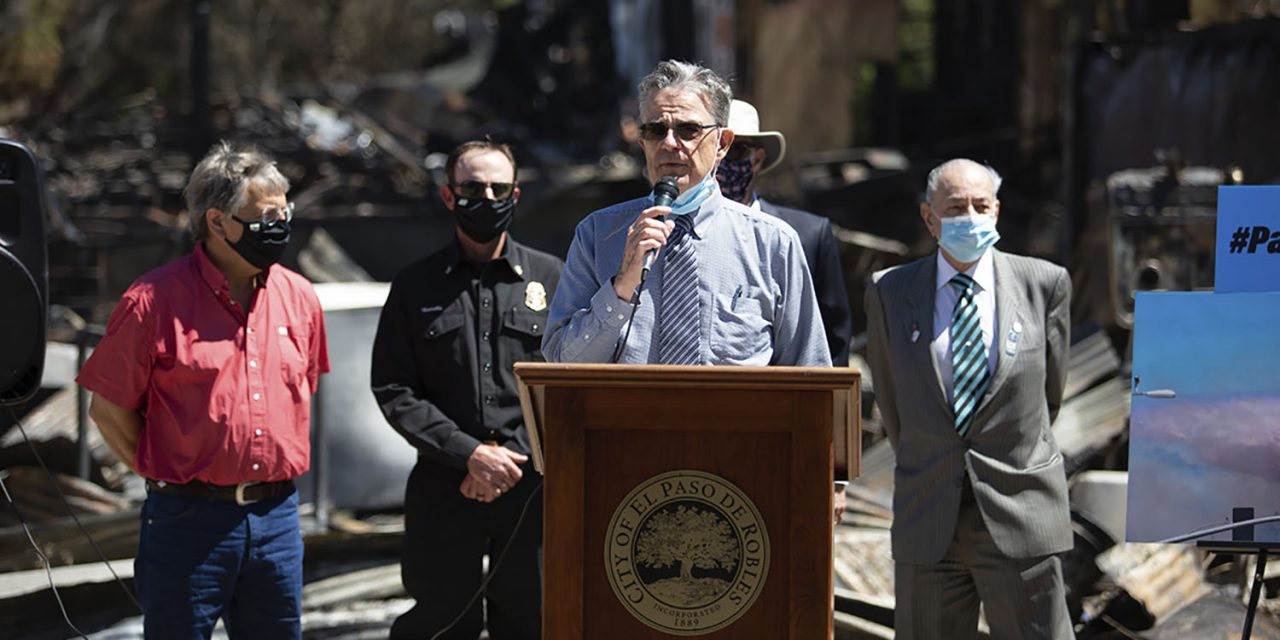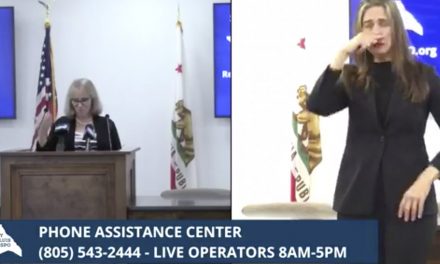Regional water officials say they are willing to work with City of Paso Robles
PASO ROBLES — Following a destructive 15-acre fire Monday afternoon that started in the Salinas Riverbed, Central Coast officials spent the rest of the week calling out the Central Coast Regional Water Quality Control Board.
“They were more concerned with the sand in the riverbed than the people living over the riverbed,” Paso Robles Mayor Steven Martin said during a press conference Thursday from in front of one of the two homes destroyed by the River Fire.
The River Fire burned approximately one acre in the riverbed Monday and jumped South River and Creston roads, where it damaged nine additional homes and charred 14 acres. Hundreds of people were evacuated from their homes due to the possible path of the fast-moving, wind-driven fire.
Hundreds of firefighters from across San Luis Obispo County converged to contain the fire. Ground and air support worked on the fire in the afternoon’s heat for more than three hours to stop forward spread. The City of Paso Robles stated the fire was 100 percent contained and that people could return to their homes Tuesday afternoon.
Letter and Press Conference
Assemblyman Jordan Cunningham (R-San Luis Obispo), San Luis Obispo County Supervisor John Peschong, and Mayor Martin sent a letter to CalEPA Secretary Jaren Blumenfeld asking the CalEPA and the Central Coast Regional Water Board not to stymie their efforts to go in and mitigate the hazardous fuels in the riverbed.
The dry Salinas Riverbed runs directly through the heart of the City of Paso Robles. Encompassing hundreds of acres, the wind-swept riverbed is covered with trees, shrubs, and dry grass. In 2019 alone, over 90 fires started in the riverbed.
“For a number of years, the City has attempted to work with the Central Coast Regional Water Board to mitigate the risk caused by the overgrowth within the Salinas Riverbed, which is the largest fire risk area in North San Luis Obispo County,” the letter states. “And for years, the City’s efforts to work constructively with the board has been stymied. The board’s staff seems unable, or refuses, to take seriously the threat posed to our residents’ lives and property by the overgrowth conditions in the riverbed.”
The letter requests that CalEPA and the regional water board grant permission to use mechanized methods to clear brush within the riverbed; expedite review of the City’s long-term maintenance plan; and recognize the City’s findings that the lack of vegetation management within the riverbed constitutes a direct threat to life and property.
Local city, county and state officials joined Martin at the destroyed home on Creston Road Thursday and continued to deliver their stern message to CalEPA and the regional water board.
“We need to rally and get in the face of CalEPA and get them to understand the severity of this situation,” said San Luis Obispo County 1st District Supervisor John Peschong on Thursday.
SLO 3rd District Supervisor Debbie Arnold, who also sits on the Fire Safe Council, said funding is available for Paso Robles’ efforts.
“This is unacceptable,” Arnold said. “The funding is in place. The funding is here. It’s a matter of getting some cooperation from some of the other agencies so that the fire prevention work can be done timely.”
In 2019, the City of Paso Robles spent $400,000 to clear overgrown vegetation and trim trees in the riverbed after declaring a state of emergency. The City was in the process of putting together a long-term maintenance plan for the riverbed.
“Fast-forward a year, plants don’t stop growing,” Mayor Martin said. “It’s all grown back and it’s grown back with a vengeance.”
Water officials told the City if it declares an emergency again and go in with mechanized equipment, they would take the City to court, Martin said.
City officials said they had been cleared to go in with hand crews to remove brush in the riverbed. They contend this is costly and time-consuming and that using mechanized equipment is more efficient and cost-effective.
According to the City, regional water officials will not allow the use of mechanized equipment without a long-term mitigation plan and permit in place. In response to the demands, regional water officials stated they want to work with the City of Paso Robles and do not know why they have waited this long to submit their plan.
Water Officials Respond
Central Coast Regional Water Quality Control Board Executive Director Matthew Keeling stated they have been working with the City for nearly a year.
“The water board and city staff have been working on this issue since the fires last summer,” Keeling stated. “This is when the City first reached out to us about the need to remove vegetation for fire suppression; this has not been going on for years as stated in Zssemblymember Cunningham’s letter.”
Keeling stated that protecting public health and safety is a priority for the Central Coast Water Board. They have been and continue to be committed to working with the City to address the significant fire problem in the riverbed.
After last year’s emergency declaration by Paso Robles, regional water officials asked the City to prepare and submit a long-term plan.
“We provided them with the information they needed to prepare this plan,” Keeling stated. “We anticipated the City’s plan earlier this year but have yet to receive it for our review and approval. The permitted plan would have allowed them to implement more comprehensive and ongoing actions starting this spring instead of having to respond to future emergencies like the most recent fire this Monday.”
Resolution in the Works
Paso Robles Fire Department Chief Jonathan Stornetta said Thursday an emergency plan was nearly complete.
City Manager Tom Frutchey said Friday both sides were being truthful, but that additional context was needed. He said the long-term plan takes time to put together and that some of the information required can only be gathered during specific times of the year.
Frutchey welcomed the water officials’ willingness to work with them in regards to an emergency plan.
Keeling stated that once they receive an “emergency” plan, the City will likely be allowed to begin mitigation efforts right away.
“We anticipate another emergency plan from them in the next day or so and will very likely allow them to do this work again without a permit with the hope that they submit a long-term plan to us for our approval, so we are not in this same situation next spring and summer like we are again now,” Keeling stated.















